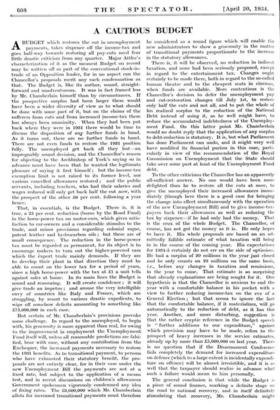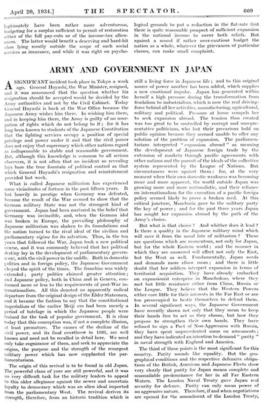A CAUTIOUS BUDGET
ABUDGET which restores the cut in unemployment payments, takes sixpence off the income-tax and goes half-way towards restoring all pay-cuts need fear little drastic criticism from any quarter. Major Attlee's characterization of it as the meanest Budget on record may be written off as part of the conventional stock-in- trade of an Opposition leader, for in 'no aspect can the Chancellor's proposals merit any such condemnation as that. The Budget is, like its author, sound, straight- forward and unadventurous. It was in fact framed less by Mr. Chamberlain himself than by circumstances. If the prospective surplus had been larger there would have been a wider diversity of view as to what should be done with some part of it, but on the claims of the sufferers from cuts and from increased income-tax there has always been unanimity. When they had been put back where they were in 1931 there would be time to discuss the disposition of any further funds in hand. As it turns out, there are no further funds in hand. There are not even funds to restore the 1931 position fully. The unemployed get back all they lost—an impregnably sound decision, and the Chancellor's reason for objecting to the Archbishop of York's saying so in advance must have been that he wanted the legitimate pleasure of saying it first himself ; but the income-tax exemption limit is not raised to its former level, nor various cancelled allowances restored ; and the public servants, including teachers, who had their salaries and wages reduced will only get back half the cut now, with the prospect of the other 50 per cent. following a year hence.
That, in essentials, is the Budget. There is, it is true, a 25 per cent. reduction. (borne by the Road Fund) in the horse-power tax on motor-cars, which gives satis- faction to car-owners and a considerable stimulus to the trade, and minor provisions regarding colonial sugar, patent leather and hydrocarbon oils ; but these are of small consequence. The reduction in the horse-power tax must be regarded as permanent, for its object is to encourage makers to turn out the higher-powered cars which the export trade mainly demands. If they are to develop their plant in that direction they must be able to count on the lower tax for a period of years, since a high horse-power with the tax at £1 a unit tells against sales at home. In its main lines the Budget is sound and reassuring. It will create confidence ; it will give trade an impetus ; and arouse the very intelligible envy of countries like Italy and France, which are struggling, by resort to various drastic expedients, to wipe off somehow deficits amounting to something like £75,000,000 in each case.
But certain of Mr. Chamberlain's provisions provoke some challenge. In regard to the .unemployed, to begin with, his generosity is more apparent than real, for owing to the improvement in employment the Unemployment Fund itself will, unless all reasonable predictions arc falsi- fied, bear with ease, without any contribution from the Exchequer, the increased payments necessary to restore the 1931 benefits. As to transitional payment, to persons who have exhausted their statutory benefit, the pro- posals are not entirely clear, for in their case under the new Unemployment Bill the payments are not at a fixed rate, but subject to the application of a means test, and in recent discussions on children's allowances Government spokesmen vigorously condemned any idea of fixing rates. The £3,600,000 which Mr. Chamberlain allots for increased transitional payments must therefore be considered as a round figure which will enable the new administrators to show a generosity in the matter of transitional payments proportionate to the increase in the statutory allowances.
There is, it will be observed, no reduction in indirect taxation, and none had been seriously proposed, except in regard to the entertainment tax. Changes ought certainly to be made there, both in regard to the so-called human theatre and to the cheapest seats in cinemas, when funds are available. More contentious is the Chancellor's decision to defer the unemployment pay and cut-restoration changes till July 1st, to restore only half the cuts and not all, and to put the whole of his realized surplus to the reduction of the National Debt instead of using it, as he well might have, to reduce the accumulated indebtedness of the Unemploy- ment Fund. On this latter point Mr. Chamberlain would no doubt reply that the application of any surplus to debt-reduction is statutory. It is, but what Parliament has done Parliament can undo, and it might very well have modified its financial purism in this case, parti- cularly in view of the recommendation of the Royal Commission on Unemployment that the State should take over some part at least of the Unemployment Fund debt.
To the other criticisms the Chancellor has an apparently all-sufficient answer. No one would have been more delighted than he to restore all the cuts at once, to give the unemployed their increased allowances imme- diately (though here there is a good case for bringing the change into effect simultaneously with the operation of the new Unemployment Bill) and to give income-tax- payers back their allowances as well as reducing the tax by sixpence—if he had only had the money. That is the crux of the whole Budget. The Chancellor, of course, has not got the money as it is. He only hopes to have it. His whole proposals are based on an ad- mittedly fallible estimate of what taxation will bring in in the course of the coming year. His expectations for 1934-5 certainly do not err on the side of optimism. He had a surplus of 39 millions in the year just closed and he only counts on 29 millions on the same basis, i.e., before any changes in taxation and remissions, in the year to come. That estimate is so surprising that already explanations are being sought for it. One hypothesis is that the Chancellor is anxious to end the year with a comfortable balance in his pocket with a view to further reducing income-tax on the eve of a General Election ; but that seems to ignore the fact that the comfortable balance, if it materializes, will go automatically to the reduction of debt, as it has this year. Another, and more disturbing, suggestion is that the rather cryptic reference in the Budget speech is " further additions to our expenditure," against which provision may have to be made, refers to the prospect of heavy increases in the service estimates, already up by more than £5,000,000 on last year. There is no question that if the Disarmament Conference fails completely the demand for increased expenditure on defence (which to a large extent is incidentally expendi- ture on offence) will be almost irresistible, and it is as well that the taxpayer should realize in advance what such a failure would mean to him personally.
The general conclusion is that while the Budget is a piece of sound finance, marking a definite stage on the road to national recovery, and in itself definitely stimulating that recovery, Mr. Chamberlain might legitimately have been rather more adventurous, budgeting for a surplus sufficient to permit of restoration either of the full pay-cuts or of the income-tax allow- ances. The latter would benefit a deserving and hard-hit class lying mostly outside the scope of such social services as insurance, and while it was right on psycho- logical grounds to put a reduction in the flat-rate first there is quite reasonable prospect of sufficient expansion in the national income to cover both reliefs. But against a sound if rather over-cautious budget the nation as a whole, whatever the grievances of particular classes, can make small complaint.













































 Previous page
Previous page